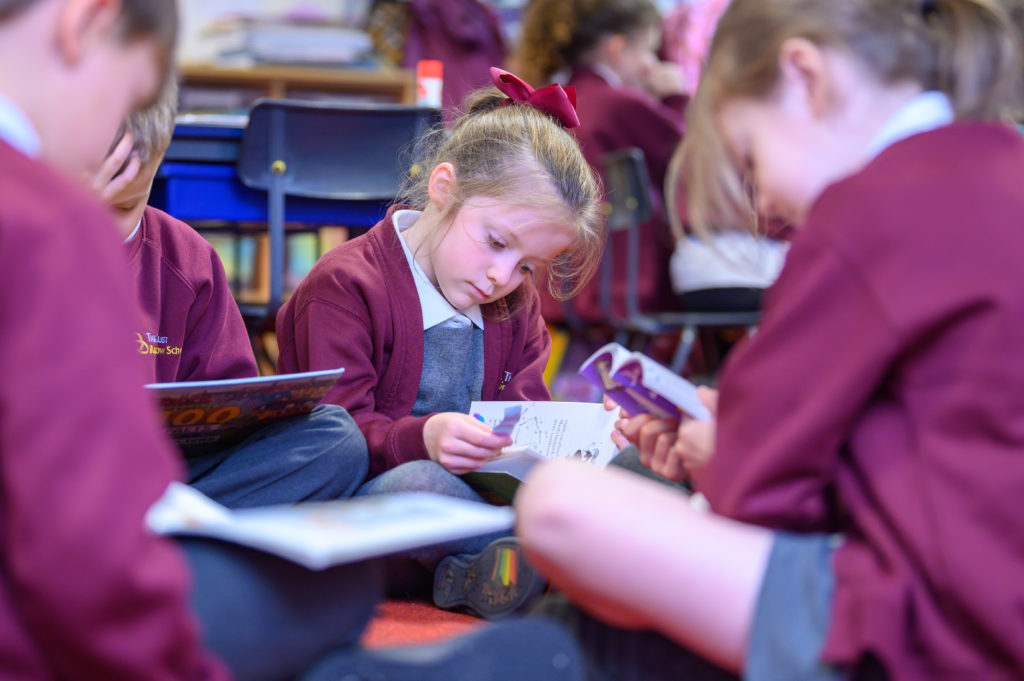Phonics & Spelling Schemes
Reading at Blacklow Brow
Reading is at the very heart of our curriculum. It is the focal point in all aspects of the children’s work; it is encouraged, developed and nurtured from the very first days of school. From the beginnings of the children’s learning at Blacklow Brow, they become immersed in reading with daily lessons centred around phonics with support from highly trained staff. We use the Ruth Miskin’s Read, Write, Inc scheme. This systematic approach gives the children valuable support and guidance – with additional one-to-one provisions if necessary. Furthermore, books are sent home for families to share and develop a love of reading and learning – including phonetically matched texts to the child’s ability.
Phonics and Early Reading
Phonics and the learning of phonics is one of the most important aspects of early learning in Blacklow Brow School. We hold it in such high-regard that we rigorously plan, assess and monitor our children’s progress at often as we can so adjustments can be made to match the individual child’s needs.
This is so instrumental in assisting the children in learning how to read and making the expected progress throughout the early years of school. Substantial investment in the scheme has allowed us to purchase home reading books that match up to the individual child’s reading and phonics level. This has given parents, carers and guardians a clearer insight into the ability of their child(ren) and actively engaged them in the learning of reading.
Read, Write Inc. lessons occur daily and are structured to facilitate every reading need of children in Blacklow Brow. The groupings are homogenous and children move between classes so they get the very best support to match their reading level. From this, the school has seen increases in data of the Phonics Screening Test conducted in Year 1.
Reading Fluency and Comprehension
As the children’s reading develops, and they have the fluency (word per minute rate, intonation and expression) and secure understanding of the content, they have more freedom to choose their own titles from the books we have in school. These can be taken from the school and class libraries and our challenging book banding that continues to develop the reading skills of all children.
Our English curriculum is centred around a diverse range of books giving children access to different historical events, authors and worldwide cultures. Events throughout the school calendar (World Book Day, Grandparents’ Reading Afternoon, McMillian Coffee and Book Morning) as well as author visits and writing workshops inspire and motivate pupils to become writers themselves: they see the purpose of their work and learning.
Children answer comprehension questions based on the V.I.P.E.R.S reading scheme and staff use precise questions to develop the children’s understandings of the key reading domains. The questions come from the central novel being used in class, but there are also designated lessons on non-fiction texts, poetry and other genres to give children a breadth of reading experiences.
For children identified as requiring additional support in reading, the support of adults is vital to make sure they keep up and not catch up with high quality and adaptive teaching. Additional time is given to these children so they have further exposure to texts and reading aloud to adults on a daily basis.
Reading for Pleasure
At Blacklow Brow, reading is seen as a pleasure and time is given as such to develop that. The school library has a wealthy of texts for all children in school and also includes subscriptions to magazines in foundation subjects as well as comics and newspapers. Research shows that enabling children to read for pleasure can result in increased empathy, improved relationships with others and improve wellbeing with an increased insight into the view and opinions of others.
Spelling
At Blacklow Brow we follow a set procedure for spellings that allows for daily practice in a variety of ways so the words are constantly studied. In Year 1, children are given specific words that are linked to their phonics and red word needs: these words are then practised daily as well as being sent home for further rehearsal.
In Year 2, there is a keener focus on independence and structure of the spelling week. Children are given up to 10 spellings that are linked to the statutory government guidelines for spelling rules and common misconception words that children are expected to know and use independently by the end of Year 2.
When children begin Key Stage 2, spelling list of up to 15 words are given out on a Monday and then tested on a Friday. Spelling rules and common misconception words – in line with the statutory government guidelines – are the key focus in each of the year groups. However, if a child requires subtle changes in the spelling structure to match their spelling age, then teachers are at liberty to alter the words.
Throughout each year group, the children are assessed using a Single Word Spelling Test that gives the teachers an indication of where the children are in terms of their spelling knowledge and the test then gives the teacher a spelling age. From this result, teacher then identify children who need additional support through intervention strategies and plan accordingly with the Teaching and Learning Lead and teaching assistants are then informed and have time to work with the individual children.
